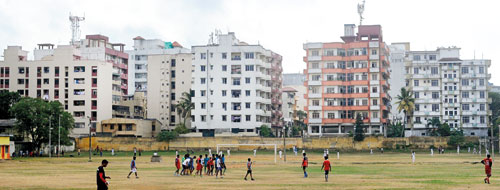Property developers propose setting up new association to fast-track approvals

File picture of the old Bambalapitiya Flats which is to be redeveloped
While many local and foreign properties (both residential and commercial) are coming up in Sri Lanka with chunks of investments, clearing the paper work and getting the approvals from relevant authorities is always cumbersome.
Property developers in Sri Lanka at a recent panel discussion in Colombo urged the formation of an association to be set up in order to clearly indicate the guidelines and procedures for investors to make things easier and faster.
The discussion was on âThe residential apartment market: current trends and future prospectsâ organized by the Lanka Property Web in parallel with a real estate exhibition at the Hilton Colombo Residencies. Industry experts discussed this issue and about the supply and demand in the residential market, and the way in which the market will head in the future.
Panelists included RB Realtors and Consultants CEO Richard Buultjens, Ekroma Realtors Managing Director Onesh Subasinghe, Colombo City Centre CEO Anand Sundaram, Capital TRUST Properties CEO Minoli Wickramasinghe, JAT Engineering Director Dinesh Fernando, Dusit Thani CEO Declan McNaughton, Iconic Galaxy Head of Sales Tharanga Thenuwara and moderator Research Intelligence Unit CEO Roshan Madawala.
It was stated that such an association needs to be set up in order to create an expeditious system to fast track the process of documentation for property developers. A panelist said, âIt has taken more than five to six months or even a year for local property developers to get the approvals sorted. If this was the case for local developers, we can imagine the process foreign investors will have to go through.â
It was also highlighted that the real estate industry in Sri Lanka needs to be protected from tuk-tuk drivers and housewives becoming agents as property brokers. An agency registration mechanism where qualified agents are registered needs to be made compulsory.
The panel also pointed out that there is poor coordination between the Inland Revenue Department and Board of Investment of Sri Lanka. There are lots of grey areas when it comes to approval of relevant documents. A streamlined process needs to be set up and there should be less bureaucracy and more transparency, noted a panelist.
Discussing the countryâs infrastructure development it was stated that a lot needs to be done outside Colombo in terms of roads and highways construction to give easy access for investors and property developers.
Investors (both local and foreign) are very sharp and they know when and where to invest the money on properties. Foreign investors know much more about the real estate market in Sri Lanka than locals. Kandy is slowly becoming the next city destination for the real estate market after Colombo. Chances of property prices doubling is expected in Kandy in the next few years, highlighted a panelist.
Property investors need to look at cities apart from Colombo. Capital gains are higher in the suburbs than in Colombo and investing in the suburbs is better in terms of return. Suburbs and outstation cities are the future for the real estate market. Now is a good time to purchase land outside Colombo before infrastructural development takes place, noted a panelist.
Another panel discussion on âColombo’s changing landscape – condos, mixed development and mega citiesâ took place where key stakeholders from the Colombo Port City project, Ministry of Megapolis and Western Development and University of Moratuwa were the panelists.
Speaking on the Colombo Port City project, the companyâs Head of Strategy and Business Development, Thulci Aluvihare mentioned that it will be an exemplary city with boardwalks, bicycle paths and so on. The city will not wipe out the view of the Galle Face Green to the Indian Ocean. âWe are expecting around 40,000 to 60,000 people living in the port city while more than 200,000 people are expected to visit (daily),â he added.
The biggest challenge for the Port City is the infrastructure development. From Kelaniya to Colombo Fort there will be an elevated highway built which will give access for people to enter the Port City in Fort, affirmed Mr. Aluvihare while elaborating that infrastructure development in the country is slow and lacking. âThough 10,000 units of apartments have come up so far in Colombo, it is not enough to supply the demand.â
He also stated that the Port City Marina Bay on a 300 hectares land is still in the pipeline. The project development will take place in three phases, he noted.
University of Moratuwa Head of department of Transport and Logistics Management, Dr. T. Sivakumar stressed that looking at the movement of people in the city, the vehicle movement will increase further. Foreign countries have made public transport the main mode of transport whereas in Sri Lanka the same public transport needs to be promoted among the public. The number of vehicles are rapidly increasing and the government needs to make the public transport system more efficient, he noted.
Speaking of transport on water bodies, Mr. Sivakumar elaborated that the canal that connects Battaramulla to Wellawatte can be used for public transportation. The Beira Lake cannot be used as a mode of transport because it is shallow but can be developed to promote tourism in Sri Lanka, he added.
During the discussion it was also mentioned that apart from Colombo, Kurunegala, Kandy and Anuradhapura are in the process of developing into big cities in the next few years.


